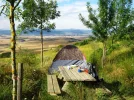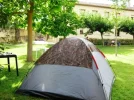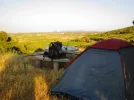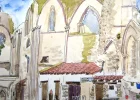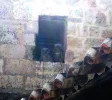Below is a post I had made before, so maybe this will give you some direction in investigating this.
Without knowing their legal status for use, there has never been a point, while walking along any of 'stages' of either the Frances or the Ingles, where I did not spot many different places for a cold camp with a small tent. Given my backpacking background, doing a spot check for such sites was sort of a game that I would play in my mind toward the end of a walking day.
I would also consider making inquiry at the local police station or town office, if possible. Check out the availability of using a church or alburgues garden or yard area (if there is someone to talk with).
If water is an issue, no biggie. When you get to the end of the day, fill up on 2 or more liters of water at the last large water source you think will be available. . bar, water fountain, a friendly home, etc. In the morning, dump out all water not used except for the .5 to 1 liter amount you'd normally carry. If you do plan to camp, then there are extremely lightweight and collapsible water containers you can stuff in your pack until needed.
-----------------------------------------
Wild camping in Spain is complicated. There is a “mother law” Article 46.1 of the order for July 28th which states that:
The law also states that it is prohibited to free camp within 200 meters of the sea, within a few kilometers of military installations, within a few kilometers of a regular camp site, and in protected areas like national parks, natural parks, bird sanctuaries called ‘ZEPA’s, (Zona Excepcional de Protección de Avifauna), etc.
However, there is the new law under the Spanish Constitution of 1978, which created seventeen ‘autonomous regions’ each with considerable, though varying, powers to make their own legal codes with their own territory.
Under these new laws, wild camping in Spain is COMPLETELY PROHIBITED in: Andalucía, Aragón, Asturias, Extremadura, Galicia, Navarra, Valencia. These areas have their own laws/permit requirements for wild camping: Cantabria, Murcia, La Rioja.
These areas fall under national rules and wild camping IS permitted: Basque Country, Cataluña, Madrid, Castilla y León, Castilla la Mancha. But in these areas you still can’t camp near the beach, in national parks, protected areas, etc. Also, a lot of the land is privately owned, so you’d have a hard time finding anywhere that would even fall into the permitted wild camping areas.
You can read more about wild camping in Spain
here. In the linked article, it says that the fine for illegal camping is 30 euros per square meter of space used, per day. However,
this link says that the fine is up to 5000 euros!
If you are just looking for a place to camp for
free but not necessarily
wild, this article has recommendations.
I’d avoid making a fire while wild camping in Spain. The locals might turn a blind eye to wild campers in some areas, but the risk of forest fire is very real and the fire will likely quickly attract police!"
















